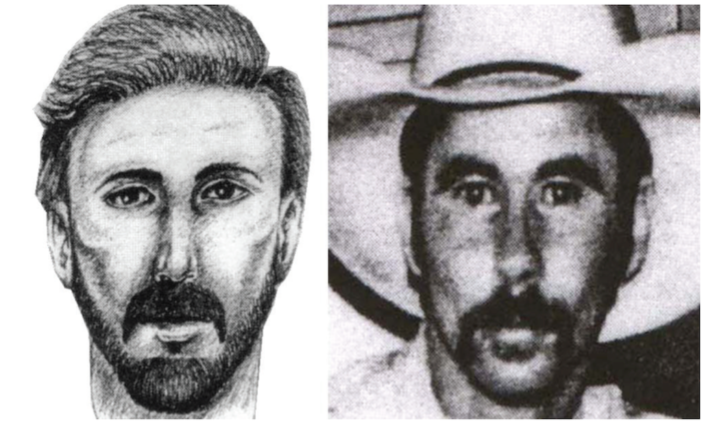Editor’s note: Michael W. Streed is a retired Orange Police sergeant, owner of SketchCop Solutions and author of the book, “SketchCop: Drawing a Line Against Crime.” You can get his book here. Behind the Badge periodically will share excerpts from his book.
One of my most successful cases was commissioned by the Long Beach Police Department. I assisted their Sex Crimes Unit with many difficult sexual assault cases for several years. They are an aggressive unit that solves many crimes and yet, for all the evil they see, they are one of the most compassionate groups of detectives I have ever worked with.
On Nov. 29, 1994, a Long Beach family had reported their 8-year-old daughter missing. They told police a family acquaintance had been visiting their home for the day. The drifter, known only as “Kelley,” fancied himself a cowboy and favored Western garb. Some called him “Cowboy Kelley.”
The man asked the child’s father if he could take her to a local carwash. The father wisely declined but later allowed him to walk her to a local market. Once out of sight, Kelley lied to the girl and told her that her father had said she could go with him in his car. When they failed to return, the father telephoned the police.
Detectives began investigating. When questioned about the suspect’s real name and identity, no one really knew who he was.
I was called to meet with the father. We worked together for a couple of hours on a composite sketch. He was quite detailed about Kelley’s description, but that was no surprise to me because he had spent a considerable amount of time with him. Also, he was traumatized by the loss of his child, but not by having known the man.
To me this meant that his recall and recognition skills were good. Despite that, it seemed that I had to work hard to get information from him. He just didn’t seem as helpful as I thought he could be, or as forthcoming as he should have been. Something was wrong for sure, but I couldn’t put my finger on it. The sketch received wide dissemination and would later prove vital in identifying the man.
Later that afternoon, a passer-by saw the girl wandering down a desert road near Moreno Valley. The Riverside County Sheriff’s Department took her into protective custody and notified the Long Beach Police Department.
Det. Jana Blair had been assigned the case from the start. I had worked with her on other cases requiring police sketches and found her to be a wonderful person, well suited for dealing with sensitive cases involving children. Smart and aggressive, she added that feminine, sometimes motherly touch that cases require from time to time.
Blair made the decision to drive out there with her supervisor, then Sgt. Diana Walton. As Sgt. Walton looked on, Blair got down onto the floor to talk to the 8-year-old and play with her at a level where she would not be fearful or intimidated. Her approach worked, and the girl disclosed to Blair that she had been sexually molested by the man known as “Cowboy Kelley.”
The victim told Blair that he drove her to remote desert area of Riverside County and that when they stopped he asked if she’d like to play a game.
He told her to take the shoelaces from her shoes, then he proceeded to use them to tie her hands over her head, behind the front passenger seat headrest. After molesting her, he let the girl out of the car and told her that if she repeated some nonsense phrases he created, she would be able to see an Indian Princess. He drove off and left her abandoned by the side of the road without concern for her personal safety.
A couple of months passed as detectives tried to identify their suspect. A break in the case came in January 1995 when the television show “Hard Copy” profiled Kelley Beckham, a modern day “horse rustler,” who would go to work on ranches and offer to exercise owners’ horses before riding off with them. A “dead-ringer” for my sketch, police soon named Beckham as a suspect in the abduction and molestation investigation.
They learned that, besides being a drifter, Beckham was quite adept at winning people’s trust. He liked to frequent areas with a heavily gay population. He would hang out at gay bars to meet unwitting targets of his scams. After befriending a man, he would go back to his home that night to sleep, eat his food and later steal his car. Beckham oftentimes got away with it when the men became reluctant to report the thefts for fear of embarrassment.
Police finally found him after he rode a horse up to a bar in Palm Springs and tied the horse up outside, just like in the movies. It wasn’t long before a sharp-eyed patron recognized him as a wanted suspect and telephoned police…
 Behind the Badge
Behind the Badge



